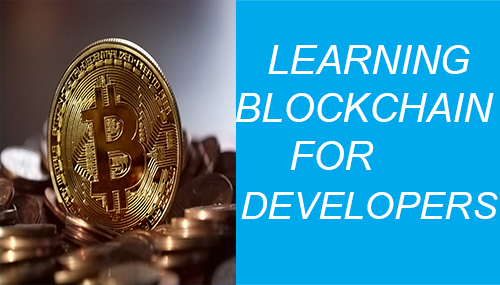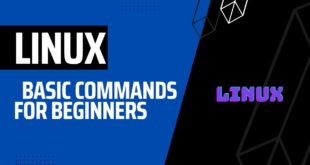Blockchain for developers
The world is rapidly changing, and so is the way people do business and make transactions. Over the past ten years, a digital banking related term ‘blockchain’ has become increasingly popular, especially with the importance of cryptocurrency augmenting. Finally, developers across the world have leveraged the technology and are developing different blockchain applications. The previous article we discussed Cyber security for Developers – How to learn cyber security , This article discusses learning blockchain for developers.
That is why blockchain development is a hot learning skill. We all know it as a record-keeping technology for bitcoin. But today, we will see in depths of the technology and assess why learning blockchain for developers is a must in the world of today and future.
So, let’s dive in;

What is Blockchain?
In the blockchain, the word block refers to the digital information stored in a chain that is a public database. Thus, in blockchain, blocks are the digital pieces of information. The block information is of three kinds.
- The first is transaction-related information such as dollar amount, time, and date of the recent purchase.
- The second type of information that blocks the store is about the participants of the transaction. It records the participant’s name in the form of a digital signature along with the store name.
- The block information can be distinguished from the other blocks through a ‘hash’ code. A new hash generates after every transaction. The ‘hash’ code is a string of letters and numbers generated by unique algorithms and tells how one block is different from other blocks. The hash depends on the new transaction and the hash generated in the previous transaction. Order is essential for entering transaction records.
For example, in the bitcoin blockchain, a single block stores a maximum of 1MB of data, which means a few thousand transactions can be stored in one block. The computer in which data is stored is called nodes. The nodes approve every transaction that occurs to ensure validity.
If the majority nodes approve a transaction, then it is stored in a block. Every block is related to the previous block via hash code, and together they make a blockchain. Every computer saves a copy of the blockchain, and after every 10 minutes, blockchain updated itself.
There are four types of blockchain networks including;
- Public blockchains
- Private blockchains
- Consortium blockchains
- Hybrid blockchains
Is Blockchain Secure?
The biggest advantage of blockchain is that it is decentralized and cannot be hacked nor its data can be tampered with.
Blockchain offers the safest transactions. It is because the database is shared across a network of computers. Now, once a record has been added to the chain, it becomes impossibly challenging to change it. Moreover, the network makes constant checks to make sure that all the copies of the database are fully identical.

History of Blockchain And How It Was Started
It dates back to 1991 when Stuart Haber and W. Scott Stornetta, described the chain of blocks that are cryptographically secured. These researchers wanted to instrument a system where no one could tamper with the document timestamps.
In 1998, Nick Szabo worked on a decentralized digital currency ‘bit gold.’ In 2000, the theory of cryptographically secured chains and its implementation ideas were published by Stefan Konst.
In 2008, some unknown developers worked behind the bitcoin under the alias of Satoshi Nakamoto and released a white paper explaining the blockchain model. The system was devised to serve as the public transaction ledger of their cryptocurrency as a cheaper approach of transferring value to users.
Based on that model, they implemented the first public ledger blockchain using bitcoin for transactions in 2009. Thanks to the decentralized system, Bitcoin offered unrivalled financial autonomy to users. Due to the fact, the crypto market rose above $200 billion with more than 2,000 cryptocurrencies available only after a decade.
Blockchain 2.0 was born in 2014 that referred to its application other than currency.
The Ethereum blockchain introduced computer programs into blocks that represented financial instruments like bonds or smart contracts. The second generation of blockchain includes several hundred ‘altcoins’ and similar other currency projects such as Ethereum and Ripple.
So, you can understand how important is blockchain for developers in this age.
What Technologies Are Used In Blockchain?
There are three technological features on which blockchain is based. These are:
Decentralization
Blockchain is decentralized, which means no group or a single person has authority over the whole network. But every network participant saves the copy of distributed ledger so no one can modify it. This unique blockchain feature ensures the security and transparency of the record.
Peer-to-peer Network
A peer-to-peer model is used by using blockchain when two parties interact, without any involvement of the third party. For example, you can make a transaction sitting in any part of the world in a few seconds. Moreover, no extra charges are deducted in the transactions.
Immutable
Immutability means once a data is written, it can’t be changed on the blockchain. Changing data in one block means changing the entire chain of the block because each block stores the preceding block hash.
It is very complicated to change all hashes as it requires a lot of computational power. Thus, the stored data in the blockchain is unsusceptible from hacker attacks making it more secure for the users.
Tamper-Proof
The embedded immutability property in blockchain makes it easier to detect data tampering. Blockchain is tampered-proof because it is easier to identify and address changes smoothly using hashes.

Use Cases of Blockchain
Why should developers learn blockchain? Though the early applications of blockchain were bitcoin and cryptocurrency, its uses expanded to several other industries over the years. So, yes, there are many benefits of blockchain for businesses that make it vital to learn it for developers.
Let’s have a look at some of them.
Smart Contracts:
Now, simple contracts can be codded using distributed ledger technology. These contracts are executed when specified conditions meet.
Government Elections:
No matter what security measures are made in government elections, there are still chances of fraud. Even if the security breaches are eliminated, the manual error still exists.
In blockchain smart contracts, the entries will be secure and transparent while maintaining the voter’s privacy.
Identity Management:
The blockchain technology provides an advanced public-private encryption method. A person can prove his/her identity using this method and digitize documents. It works as a saviour during online interactions and financial savior on a shared economy.
Internet of Things:
Blockchain smart contracts also make possible the automation of remote management system. The exchange of data takes place between objects and mechanisms with a combination of software and sensor network and improves system efficiency increases.
Crowdfunding:
Blockchain takes crowdfunding to the next level by creating crowd-sourced capital scheme funds.
Stock Trading:
With Instant peer-to-peer trade confirmations, intermediaries such as custodians and auditors are removed from the process.
Land Title Registry:
The record-keeping becomes more efficient with publicly accessible ledgers. Property tiles are secured on blockchain as they are more susceptible to fraud.
How To Become A Blockchain Developer?
A blockchain developer’s job is to develop and optimize blockchain protocol, craft blockchain system architecture, build web apps, and smart contracts using blockchain technology. There are two types of blockchain developers:
- Core blockchain developers
- Blockchain software developers
To become a blockchain developer, basic education in IT and computer sciences is necessary after which an individual can head to blockchain specific courses, including language programming and more and learn the skills.
There are some technical skills required to become a blockchain architecture. Let’s go through those skills.
Blockchain Architecture Understanding:
First, beginners need to understand blockchain architecture and its working completely. Also, understand some key concepts such as distributed ledger technology, hash functions, consensus.
Data Structures:
It is one of the must-have skills for becoming a blockchain developer. It gives an ability to manage blockchain and configure it as per requirement.
Smart Contract Development:
The core of modern blockchain systems are smart contracts. You need to learn any basic programming language such as Solidity to develop smart contracts.
Basic Cryptography Understanding:
Data in the blockchain is secured by using highly secured cryptographic algorithms. It helps to implement DApps and services related to blockchain more confidently.
After a clear understanding of blockchain concepts, now is the time to practice the following steps to become a developer.
Understand the Blockchain Ecosystem:
After having a clear understanding of blockchain concepts and gaining some technical skills, the first thing that comes after it is learning about the blockchain ecosystem. This includes learning BaaS (Blockchain as a Service), enterprise blockchain platforms, and about famous DApps.
Blockchain System Working:
Start working as a blockchain development through basic cryptocurrency. Just buy some cryptocurrency and store it in an offline wallet. Cryptocurrency purchases will help you understand how the blockchain use-case process works.
Start Coding:
Beginners should start learning programming with Solidity. It helps developers to create smart contracts and DApps on Ethereum blockchain. Then go in-depth of different open-source blockchain platforms.
Then start with creating a simple block and then a blockchain out of that block. Learn about genesis block and implement it. Validate the chain of blocks and use it by running tests. Now you have experience of creating and working with basic blockchain.

Blockchain for developers – Learning Resources
There are many online resources for learning blockchain as well as institutional courses. Below are some best courses and books about learning blockchain that will be very helpful, especially for beginners.
Learn Blockchain:
It is a free mini-course offered by One Month that explains the blockchain technology and bitcoin basics.
Blockchain University:
It is an educational website for managers, developers, and entrepreneurs to learn the blockchain ecosystem. It offers different private and public training programs, demo events, and hackathons. The programs are based on solution-oriented thinking designs and hands-on training.
Blockchain Foundation and Use Cases:
This course is offered at Coursera. It provides a blockchain introduction to both developer and non-developer audience.
Blockchain Deep Fundamentals:
Ivan on Tech offers this course for those who want to build a firm understanding of the working of blockchain technology.
Blockchain Learning Center:
Codementor offers a collection of resources on blockchain programming as well as keeps up-to-date about the latest developments in blockchain
Blockchain Beyond and Basics:
At Lynda.com, you can join this course to learn about blockchain and decentralized implications, and data storage encryption for society and business with Dr. Jonathan Reichental.
Blockchain Revolution:
The book is available at Amazon. It explains how blockchain technology is changing the future of business, transactions, and money.
Blockchain Alliance:
It was founded by Coincenter, the blockchain Chamber of Digital Commerce and news organization. It is a collaboration between the public and private blockchain community, regulators, and law enforcement.
The platform aims to make the blockchain ecosystem safer and promote technological developments. They provide technical assistance, education, and information sessions, digital currencies that utilize blockchain technology such as bitcoin, ripple, Ethereum, etc.
Summary
Reading all the information, you can understand how important is the blockchain for developers. The cryptocurrency market is on the rise, which calls for more and more blockchain experts to work. However, the uses of blockchain are not limited to cryptocurrencies but have implications in government, banking and cybersecurity fields.
Previous Article:
Next Article:
Related Articles:
- Data Science for Developers, How to become a data analyst?
- Artificial intelligence for developers and how to learn artificial intelligence
- Artificial intelligence for developers and how to learn artificial intelligence
 Best Tech Blog For Programming Articles And Video Tutorials Code Is Easy
Best Tech Blog For Programming Articles And Video Tutorials Code Is Easy



